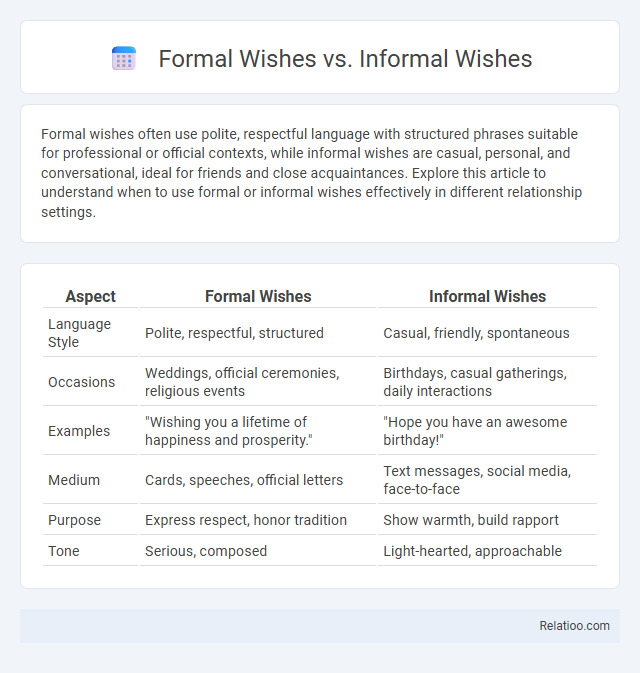Formal wishes often use polite, respectful language with structured phrases suitable for professional or official contexts, while informal wishes are casual, personal, and conversational, ideal for friends and close acquaintances. Explore this article to understand when to use formal or informal wishes effectively in different relationship settings.
Table of Comparison
| Aspect | Formal Wishes | Informal Wishes |
|---|---|---|
| Language Style | Polite, respectful, structured | Casual, friendly, spontaneous |
| Occasions | Weddings, official ceremonies, religious events | Birthdays, casual gatherings, daily interactions |
| Examples | "Wishing you a lifetime of happiness and prosperity." | "Hope you have an awesome birthday!" |
| Medium | Cards, speeches, official letters | Text messages, social media, face-to-face |
| Purpose | Express respect, honor tradition | Show warmth, build rapport |
| Tone | Serious, composed | Light-hearted, approachable |
Understanding Formal Wishes
Understanding formal wishes involves recognizing their structured language and polite tone, typically used in professional or official contexts such as business correspondence and formal events. These wishes emphasize clarity, respect, and appropriate etiquette, often including precise phrases like "I wish you success" or "May you have a prosperous year." Distinguishing formal wishes from informal ones, which use casual or colloquial expressions, is essential for effective communication and maintaining professionalism.
Defining Informal Wishes
Informal wishes are casual expressions of hope or desire typically used in everyday conversations among friends or family, characterized by relaxed language and simplicity. Unlike formal wishes, which follow structured phrasing and polite conventions, informal wishes include phrases like "Hope you have a great day" or "Wishing you all the best" without strict etiquette. Understanding these distinctions helps you choose appropriate language for your social context, ensuring your message feels genuine and suitable.
Key Differences Between Formal and Informal Wishes
Formal wishes typically use polite, structured language and are common in professional or official contexts, emphasizing respect and courtesy. Informal wishes feature casual, conversational tone and are more personal, often used among friends and family. The key difference lies in the level of formality, vocabulary choice, and context appropriateness, affecting how the wish is perceived and received.
Appropriate Contexts for Formal Wishes
Formal wishes are appropriate in professional settings such as business correspondence, official events, or academic ceremonies where respectful and polite language is essential. Informal wishes are suited for casual interactions with friends, family, or close colleagues, allowing for a relaxed and personal tone. Understanding when to use formal wishes ensures your message maintains the proper decorum and is received appropriately in diverse social or professional contexts.
When to Use Informal Wishes
Informal wishes are best used in casual conversations with friends, family, or colleagues when the tone is relaxed and friendly. Your choice to use informal wishes can create a personal and warm atmosphere, making your message feel genuine and approachable. Formal wishes are more appropriate for professional settings, official events, or when addressing someone with respect, while simple "wish" statements fit neutral or written contexts without emotional emphasis.
Language and Tone: Formal vs Informal
Formal wishes employ polite, structured language and a respectful tone suitable for professional or official contexts, such as "I wish you success in your endeavors." Informal wishes use casual, conversational language with a warm, friendly tone, typical among friends or close acquaintances, like "Hope you have an awesome day!" The choice between formal and informal language and tone directly affects the appropriateness and effectiveness of the wishes in different social or communicative settings.
Common Examples of Formal Wishes
Formal wishes often include expressions like "Congratulations on your achievement," "Best wishes for your continued success," and "Wishing you a prosperous New Year," which are commonly used in professional or official settings. Informal wishes tend to be more casual, such as "Happy birthday, have a great day!" or "Good luck on your exam!" Personal wishes simply express desires for someone's happiness or success without a specific occasion, like "I wish you happiness." Understanding the distinctions enables you to choose the most appropriate tone for your message.
Sample Informal Wishes and Phrases
Formal wishes often use polite, structured language ideal for professional or ceremonial occasions, while informal wishes are casual and personal, suitable for friends and family. Sample informal wishes include phrases like "Hope you have an awesome day!" or "Wishing you all the best on your birthday!" Your choice of wish should reflect the relationship and context to convey genuine sentiment effectively.
Cultural Considerations in Wishing
Cultural considerations play a crucial role in distinguishing formal wishes, informal wishes, and the general use of "wish." Formal wishes often follow specific customs, using polite language and titles to convey respect in professional or traditional settings. Informal wishes tend to be relaxed and personal, reflecting close relationships, while the term "wish" itself adapts flexibly across cultures, embodying hopes or desires that align with social norms and expectations unique to each culture, ensuring your message is both appropriate and meaningful.
Tips for Choosing the Right Style
Choosing the right style between formal wishes, informal wishes, and general wishes depends on the relationship with the recipient and the context of the occasion. Formal wishes are suitable for professional settings, official events, or when addressing someone with whom you have a respectful distance, often using polite language and structured expressions. Informal wishes fit casual interactions among friends and family, emphasizing warmth and personal tone, while simple wishes work well for universal occasions, maintaining neutrality and clarity.

Infographic: Formal Wishes vs Informal Wishes
 relatioo.com
relatioo.com